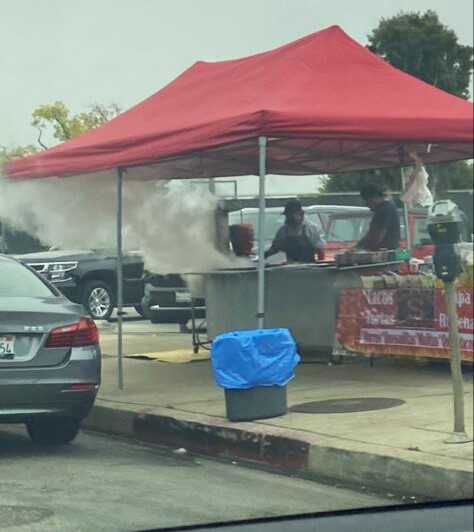
This taco stand sets up on the sidewalk along Sunset Boulevard. It does not have the proper sanitation facilities.
There is a proverb “the road to hell is paved with good intentions,” which can be interpreted to mean that that good actions may have unintended consequences.
On September 17, 2018, former Governor Jerry Brown signed Senate Bill 946, which is also known as the Safe Sidewalk Vending Act. This law decriminalizes sidewalk vending in California and allows local authorities to adopt non-criminal laws to protect public health, safety and welfare. State Senator Ben Allen voted in favor of the bill when it passed in August 2018.
The state law trumps local laws, but on January 30, City News Services (CNS) (“LA County Tentatively Approves Sidewalk Vending Ordinance”) and the L.A. Times (“LA County Backs a Legal Path for Street Vendors in Unincorporated Areas”) ran stories about the Los Angeles County Supervisors working on vending ordinances.
According to CNS “The Los Angeles County Board of Supervisors has tentatively approved a pair of ordinances regulating sidewalk food vendors, including the establishment of fees that the county hopes to largely subsidize, and the ordinances will return to the board for final approval next week.”
According to Supervisor Hilda Solis “For many residents, especially those from low-income or immigrant communities, food vending represents one of the few economic pathways to attain financial independence and stability.”
For a vendor to obtain a health permit it would be from $508 to $1,186, but Solis plans to introduce a motion next week aimed at largely subsidizing those fees for low-income vendors, who could have as much as 75% of the health-permit cost covered.
Another ordinance would prohibit vendors from connecting to public utilities, such as water and power sources. Vendors would also have to register with the county and pay $604 – but that fee would also be subsidized.
The L.A. Times wrote that Kathryn Barger “said she had heard from business owners who believed the rule change would create an uneven playing field between bricks-and-mortar businesses and street vendors, who she believed would get off relatively easy for violating the rules.”
Neither article asked how the vendors would be taxed, or if they would be required to give workers W9 forms to fill out, or if minimum wages would be required of the people working for the vendors, which is a prerequisite for brick and mortar businesses. California law requires fast food establishments to pay $20 minimum wage to workers.
The Palisades is represented by L.A. County Supervisor Lindsey Horvath, who will be appearing at the annual Palisades Democratic meeting on Sunday click here.

Will street vendors be required to meet health standards? Such as an A rating?
What a farce. We all know the answer to the unasked questions. We also know that when Hilda Solis speaks of “immigrant communities” she is not speaking of those that arrived legally. What incentive does Rodolfo at Gracias Senor have to adhere to the law when the taco stand doesn’t have to? There are too many people picking and choosing the laws they will adhere to based on what works for that particular individual. For some, it means the availability of a cheap, tasty taco that may or may not be safe and is likely served by someone making $6/hr. For others it is the ability to drive 100 mph on PCH resulting in the death of innocent bystanders.
The canopied food stand setting up at night outside Ralphs parks an unmarked dirty white van and unloads plastic containers of meat and sauces on the asphalt of the parking lot. It also uses portable charcoal grills on the sidewalk, propane tanks and open flames, all in blatant violation of fire laws (in addition to health and safety violations for food preparation). I do not know why Station 69, across the street, does not enforce the dozen obvious violations, all in the midst of a high fire severity zone. They even continue to cook on open flames despite high wind advisories and on “no burn” days. We have spoken to the health department who say they have already shut this unpermitted operation down once, but there is a backlog. They have asked why our local police and fire station are not acting. Why isn’t our local enforcement getting involved?
My understanding is that only the health department could shut it down for food safety. I will ask Station 69 about the propane tanks and open flames. I would suggest going to State Senator Ben Allen (310)414-8190 or senator.allen@senate.ca.gov At the annual Democratic Club meeting, he said he was interested in hearing from people.